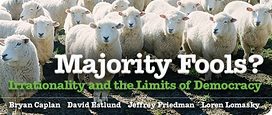I have mainly argued against Bryan’s inference from the supposed superior expertise of economists and college grads to their having political authority. But Bryan is partly concerned just to show that voters are ignorant and irrational to a disturbing degree, and that would be important whether or not it directly supports the authority of experts. What, then, might its importance be? (Thanks to Will Wilkinson for pressing this.)
One set of questions concern how we are to conceptualize the idea of voter competence so that we know what we mean when we say they don’t have it. There are some puzzles about this. We have already discussed the wrinkle introduced by the fact that political decisions are also typically moral. That means there is no generally accepted answer key by which to grade performance. But I put that aside here.
Here’s a second puzzle about the idea of voter competence: Suppose we set the wisdom-checkers loose on parents rather than voters. We ask them questions about child development, nutritional science, educational techniques, effective discipline strategies, medications, household safety, etc. How well do you think they would do? There are some studies of this kind, and of course parents can be shown not to know very much about these ostensibly important topics. This doesn’t begin to convince me that parents generally do a lousy job. So I’m not sure why we should take the very same kind of data about voters to be so disheartening. Certainly, in both cases it makes sense to bring this kind of information to people, but that’s different. What should we make of this analogy?
A third puzzle about voter competence is this: How do we know we have not already taken a lot of competence for granted before framing the questions that purport to demonstrate ignorance? If I want to know whether you know how your car works, it might seem silly to ask you what the tires are made of, or what fuel it runs on. Silly, only because OF COURSE you know that. But if I ask you how the clutch works, or whether your car has a fuel injector, you might look pretty ignorant pretty fast (I would). But if we assumed that most people knew those things too, we could still easily find questions to separate the real car knowers from the rest of us. But which set of data should we use to conclude that people are woefully ignorant or irrational in their views about how cars work? You might say that the analogy doesn’t work because we entrust our cars to experts after all. But we do that by choice, and we choose our experts. Some of the experts are chosen democratically, like those who set the inspection standards, safety standards, efficiency standards, etc. Others are chosen in the market, such as your favorite mechanic. The analogy isn’t perfect, but I think it displays this puzzle: what counts as seriously defective knowledge, given that we can always find difference between some who know more and some who know less.
A second whole set of questions concern what should be done if voters are indeed grievously incompetent. My own view of democratic legitimacy and authority does depend on some level of competence: aggregate performance better than a random device. It’s a long story why that’s the criterion, but I just note that I share Bryan’s view that voter competence matters. If the best theory of legitimacy and authority requires some level, and that level is not met, we ought to either see if we had the wrong theory, or conclude that democracy does not provide legitimacy or authority (or, perhaps, not yet). I take no stand on whether we are in that situation, partly because I don’t have a firm view about how to measure voter competence beyond the wisdom-checking that yields results of uncertain use.
One thing Bryan and I certainly agree about is that since voter competence matters, it would be good to work toward improving it. I join him in encouraging economists to work to educate the public for their political role. To economists I add lawyers, doctors, teachers, nurses, programmers, secretaries, journalists, retailers, students, police, etc. It is natural to ask whether there is an appropriate role for the state in this kind of citizen education. I believe there is, although I would be quite careful about how specific public teachings should be. A view’s being true would not be enough to get it on the curriculum. We might be right, but what makes us boss?

